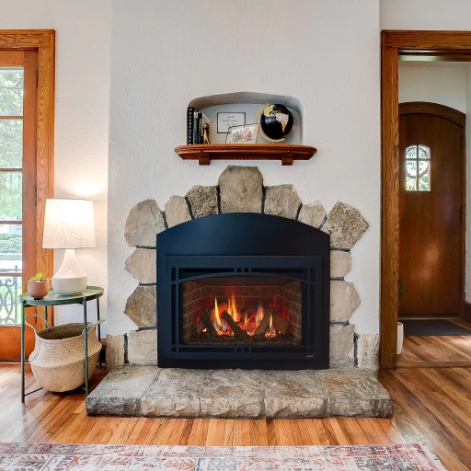Table of Contents
Are you tired of dealing with unpleasant fireplace odors in your home?
We will explore the causes of fireplace odors and provide you with effective ways to prevent and eliminate them.
From cleaning the chimney and using natural deodorizers to considering a switch to a gas or electric fireplace, we’ve got you covered.
Learn how you can maintain an odor-free fireplace and enjoy a cozy and fresh atmosphere in your home.
What Causes Fireplace Odors?
Fireplace odors can be caused by various factors such as soot buildup, smoke stains, and poor indoor air quality. These odors can result from a lack of proper chimney cleaning, leading to the accumulation of creosote and soot deposits within the chimney and fireplace.
If left unaddressed, these odors not only create an unpleasant living environment but can also have a significant impact on the indoor air quality. Soot and creosote buildup not only emit foul smells but can also release harmful pollutants into the air, posing health risks, especially for those with respiratory conditions. Regular chimney cleaning is crucial to prevent these issues, as it removes the accumulated debris and ensures that the fireplace operates efficiently and safely.
How Can I Prevent Fireplace Odors?
Preventing fireplace odors involves regular chimney cleaning to eliminate soot buildup and using an air purifier to maintain indoor air quality. By ensuring proper ventilation and chimney maintenance, you can effectively reduce and prevent musty smells and other odors associated with fireplaces.
Proper ventilation plays a crucial role in circulating fresh air and preventing the accumulation of stale odors. Installing a carbon monoxide detector near the fireplace adds an extra layer of safety by alerting you to any concerning gas levels. Incorporating occasional burns of citrus peels or herbs in your fireplace can impart a pleasant aroma while naturally combating any lingering odors within your home’s living spaces.
What Are the Best Ways to Get Rid of Fireplace Odors?
To effectively get rid of fireplace odors, it is essential to deodorize the space, improve ventilation, and eliminate the source of the smell. Utilizing both natural remedies and commercial deodorizers can help in neutralizing and removing lingering odors from the fireplace environment.
Enhancing ventilation by opening windows or using fans can aid in dissipating the odors more quickly. Cleaning the fireplace and chimney regularly is crucial to prevent the buildup of soot and debris that can contribute to unpleasant smells.
For a more natural approach, placing bowls of baking soda or vinegar near the fireplace can help absorb odors. Alternatively, using specialized fireplace deodorizers that are designed to target smoke and creosote odors can provide a more targeted solution to effectively combat stubborn smells.
Clean the Chimney and Fireplace
Regular cleaning of the chimney and fireplace is crucial to prevent soot buildup, smoke stains, and creosote accumulation. Hiring a professional chimney sweep can ensure thorough cleaning and maintenance to avoid odors caused by these issues.
Professional chimney sweeps have the expertise and tools to properly remove debris, soot, and creosote from the chimney and fireplace, reducing the risk of chimney fires and improving indoor air quality. In addition to professional help, homeowners can also take preventive measures by using seasoned hardwood for fires, which produces less creosote. Installing a chimney cap can prevent debris and animals from entering the chimney, further reducing odors and potential blockages. Combining these strategies with regular inspections and cleanings can help maintain a safe and odor-free fireplace environment.
Use Natural Deodorizers
Natural deodorizers such as baking soda and vinegar can help in eliminating musty smells and refreshing the fireplace area. These simple yet effective remedies can neutralize odors without harsh chemicals, providing a natural and safe solution for maintaining a fresh-smelling hearth.
In addition to being environmentally friendly, natural deodorizers are readily available in most households, making them a convenient option for tackling fireplace odors. Baking soda, known for its absorption properties, can absorb and eliminate odors effectively when sprinkled around the fireplace. Vinegar, on the other hand, not only neutralizes odors but also disinfects the area, ensuring a clean environment. By using these natural remedies, you can keep your fireplace smelling pleasant and inviting without exposing yourself to harmful synthetic fragrances.
Try Commercial Fireplace Deodorizers
Commercial fireplace deodorizers with odor-neutralizing properties can effectively tackle smoky scents and provide a fresh atmosphere. Using quality air fresheners designed for fireplace odors can offer a quick and convenient solution to eliminate unwanted smells.
These deodorizers work by capturing and neutralizing the particles responsible for the smoky odors, rather than just masking them. By effectively neutralizing the source of the smell, they help in improving indoor air quality, making the environment more pleasant and welcoming. This approach not only addresses the immediate issue of smoke odor but also contributes to a healthier living space.
With a range of scents available, using air fresheners can add a touch of personalization to the ambiance, enhancing the overall experience of enjoying a cozy fire.
Use Baking Soda and Vinegar
Baking soda and vinegar, as natural remedies, can efficiently deodorize a fireplace, eliminating unwanted odors. The combined properties of these household items make them effective in neutralizing smells and maintaining a fresh and clean hearth environment.
Baking soda, a mild abrasive, works to absorb and eliminate odors by deodorizing the surfaces it comes into contact with in the fireplace.
Vinegar, which is known for its acidic nature, helps break down stubborn odors and acts as a disinfectant, further contributing to an odor-free space.
When used together, they create a safe and eco-friendly approach to removing odors without harsh chemicals, making them ideal choices for households looking for natural solutions to fireplace deodorizing.
Burn Scented Candles or Incense
Burning scented candles or incense can help mask smoky scents and infuse pleasant fragrances into the fireplace area. Aromatic options like essential oils and scented candles offer a delightful way to combat odors and create a cozy atmosphere in your living space.
The use of scented candles and incense not only freshens up the air but also contributes to a calming environment. Essential oils, known for their therapeutic properties, can effectively neutralize the lingering smoke smell and promote relaxation.
By incorporating these aromatic solutions strategically around your home, you can transform any room into a welcoming haven. Consider diffusing lavender or eucalyptus essential oils for a revitalizing aroma or lighting a vanilla-scented candle for a warm, inviting touch.
How Can I Maintain an Odor-Free Fireplace?
Maintaining an odor-free fireplace requires regular cleaning and upkeep, along with strategic installations like a chimney cap and fireplace insert. By implementing these maintenance practices, you can enjoy a fresh and inviting hearth environment throughout the year.
Regularly cleaning out ash and debris, along with scheduling annual chimney inspections, are essential steps in preventing lingering odors in your fireplace. Chimney caps can also help in keeping out animals and debris that can contribute to unpleasant smells. Opting for a high-quality fireplace insert can improve airflow and combustion efficiency, reducing the likelihood of smoky odors.
To enhance the ambiance, consider using fragrant firewood or adding scented candles nearby to create a cozy and welcoming atmosphere.
Regularly Clean and Maintain the Fireplace
Regularly cleaning and maintaining the fireplace involves removing ash, addressing soot deposits, and ensuring proper chimney draft. Home maintenance tasks like these are essential for preserving indoor air quality and preventing the accumulation of odors in the fireplace environment.
Cleaning the fireplace typically starts with ash removal, which should be done after every fire to avoid buildup that can hinder proper ventilation. Soot deposits on the fireplace walls can be managed by using a vacuum with a brush attachment or a specialized soot cleaner. Ensuring a proper chimney draft is crucial in preventing the backflow of smoke and decreasing the risk of unpleasant odors lingering in your home. By regularly performing these maintenance tasks, you not only keep your fireplace clean but also improve the overall air quality within your living space.
Properly Season and Store Firewood
Properly seasoning and storing firewood is crucial for maintaining an odor-free fireplace environment. Controlling humidity levels and ensuring appropriate firewood storage can prevent the development of musty smells and maintain optimal conditions for a wood-burning fireplace.
By allowing firewood to season properly, moisture content is reduced, leading to a cleaner burn with less smoke and increased heat output. Storing firewood correctly, such as keeping it off the ground and allowing for proper air circulation, further aids in maintaining its quality. To control humidity levels, it’s essential to store firewood in a well-ventilated area and avoid exposure to direct moisture. These practices not only improve the efficiency of your fireplace but also help extend the lifespan of your firewood.
Install a Chimney Cap
Installing a chimney cap is an effective way to prevent fireplace odors by enhancing ventilation and reducing debris entry. The addition of a chimney cap can improve air circulation and prevent unwanted odors from permeating the living space.
A chimney cap acts as a barrier against rain, snow, and animals, further protecting the chimney structure. By allowing proper airflow while keeping out moisture and animals, chimney caps help maintain the integrity of the chimney system.
Ventilation fans play a crucial role in ensuring continuous airflow. It aids in the elimination of stale air and maintaining a fresh indoor environment.
To optimize the efficiency of chimney caps, regular inspections and cleaning are recommended. This will prevent blockages and ensure proper functioning for odor-free fireplace experiences.
Use a Fireplace Insert
Utilizing a fireplace insert can help prevent fireplace odors by containing smoke and enhancing the efficiency of heat distribution. This addition not only improves the functionality of the fireplace. It also contributes to the overall aesthetic appeal with various hearth accessories.
By effectively trapping smoke and regulating airflow, a fireplace insert not only minimizes the emission of odor. It also ensures that the heat produced is efficiently distributed throughout the room.
Incorporating hearth accessories can elevate the ambiance of the fireplace area, providing both practical and visual enhancements. Hearth accessories include decorative screens, toolsets, and log holders.
Regular maintenance such as cleaning the chimney and replacing worn gaskets is essential. This will optimize the performance of fireplace inserts for a cleaner and more efficient hearth.
Consider Switching to Gas or Electric Fireplace
Considering a switch to a gas or electric fireplace can be a practical solution. It will minimize fireplace odors and enhance convenience. These modern options offer efficient venting systems and contribute to overall home improvement. In addition, they provide cleaner and hassle-free alternatives to traditional wood-burning fireplaces.
Homeowners can enjoy a significant reduction in the lingering smell often associated with wood-burning fireplaces. This can be accomplished by opting for a gas or electric fireplace. The venting systems in these alternatives effectively channel any odors outside. As a result, indoor air quality remains fresh and pleasant.
This transition not only eliminates the inconvenience of cleaning up ash and soot regularly. It also adds a modern and stylish touch to any living space. The ease of use and programmable features in contemporary gas and electric fireplaces make them a practical and efficient choice. This is especially true for homeowners seeking a hassle-free heating option.
Frequently Asked Questions
1. What causes fireplace odors?
Fireplace odors typically arise from soot buildup, smoke stains, and inadequate chimney cleaning. These issues can lead to creosote accumulation, which emits unpleasant smells and releases harmful pollutants.
2. How can I prevent fireplace odors?
To prevent fireplace odors, regularly clean your chimney and ensure good indoor air quality through proper ventilation. Using air purifiers and keeping the area well-ventilated can help minimize odors.
3. What are the best ways to get rid of fireplace odors?
To effectively remove fireplace odors, clean the area regularly, improve ventilation, and use natural or commercial deodorizers. Regular chimney cleaning is crucial for eliminating the sources of these odors.
4. How can I maintain an odor-free fireplace?
Maintaining an odor-free fireplace involves regular cleaning of the chimney and fireplace, and ensuring good ventilation. This can be accomplished by using natural deodorizers like baking soda. Additionally, consider periodic professional inspections to keep everything in optimal condition.
5. Can switching to a gas or electric fireplace help with odor issues?
Switching to a gas or electric fireplace can significantly reduce odor issues. These options do not produce smoke or creosote, common in traditional wood-burning fireplaces. As a result, they offer a cleaner and more convenient alternative.
6. Are there natural remedies for fireplace odors?
Yes, natural remedies like vinegar, baking soda, or citrus peels can help eliminate fireplace odors. These substances absorb and neutralize odors, providing a fresh and clean scent to the area.
Latest Articles

What Is An NG (Natural Gas) Indicator And Why You Need It For Your Fireplace
Table of Contents1 Understanding Natural Gas Fireplaces2 What is an NG Indicator?3 Importance of NG Indicators for Safety4 Types of NG Indicators5 Installation and Maintenance of NG Indicators6 Signs of a Faulty NG Indicator7 Frequently Asked Questions Natural gas fireplaces are a favored option among numerous homeowners due to their convenience and effectiveness. But, what is an NG (Natural Gas) indicator and why you need it for your fireplace? It is imperative to comprehend how they function and the significance of having an NG (Natural Gas) indicator for safety purposes. This article delves into the definition and significance of NG indicators. We will discuss the potential hazards associated with the absence of one and the various types of indicators accessible. Also, we will discuss installation and maintenance recommendations, and methods to recognize and rectify issues with malfunctioning indicators. Stay well-informed and ensure the safety of your home by referring to this exhaustive guide. Understanding Natural Gas Fireplaces Natural gas fireplaces serve as an efficient and convenient heating option for numerous households. They utilize natural gas as a fuel source to deliver consistent warmth and ambiance. How They Work and Why They Need NG Indicators The operation of natural gas fireplaces involves igniting natural gas to generate heat. This process requires diligent monitoring to ensure both safety and efficiency, a task facilitated by the use of NG indicators. NG indicators play a critical role in detecting potential gas leaks. They enable residents to promptly address and mitigate any associated hazards. Through continuous monitoring of gas levels and providing timely warnings and alerts, NG indicators uphold a secure indoor environment. It is imperative to ensure that these indicators function properly to facilitate the effective operation of natural gas fireplaces. This helps mitigate the inherent risks linked to gas leaks. What is an NG Indicator? An NG indicator is a specialized device equipped with advanced sensors and technology. It is specifically designed to detect natural gas leaks and monitor gas pressure in appliances, such as fireplaces. Definition and Purpose The NG indicator functions as a detector that monitors gas appliances for potential leaks. It provides essential functionality to ensure safety in households utilizing natural gas. These detectors play a crucial role in protecting residences by notifying occupants of dangerous gas leaks long before they escalate into perilous situations. Through continuous monitoring of gas levels in the vicinity, NG indicators offer an additional layer of protection. This is particularly important in properties that rely on gas-operated fireplaces or stoves. These devices not only help avert potential disasters but also enhance the overall peace of mind of homeowners. They assure them that their living spaces are equipped with reliable safety features. Importance of NG Indicators for Safety Natural gas indicators are essential for maintaining safety in households equipped with natural gas appliances. These devices serve as a proactive measure to promptly detect gas leaks. This offers homeowners a sense of security and assurance. Potential Dangers of Not Having an NG Indicator The absence of an NG indicator in residences equipped with natural gas appliances can pose significant hazards. This includes the risk of undetected gas leaks , carbon monoxide poisoning , and pilot outages that may lead to dangerous situations. These potential risks can profoundly impact indoor air quality. They directly influence the health and safety of individuals residing in the household. Undetected gas leaks can go unnoticed, gradually permeating the air and creating a potentially explosive environment. Insufficient ventilation from undetected exposure to carbon monoxide can lead to serious health complications. These range from mild symptoms such as dizziness to fatal poisoning. Without proper monitoring from an NG indicator, families are left susceptible to these concealed threats. This underscores the critical importance of implementing proactive measures to mitigate such risks. Types of NG Indicators Indicators for Natural Gas (NG) are available in diverse types. Each presents distinct detection capabilities tailored to specific requirements, encompassing both manual and automated alternatives. Manual vs. Automatic Indicators Manual NG indicators require user intervention for monitoring gas levels and identifying leaks. On the other hand, automatic indicators employ sophisticated technology to deliver continuous, real-time monitoring. This heightened efficiency and oversight enhance safety protocols. Conventional manual indicators rely on individuals to physically inspect and evaluate gas levels periodically. This renders them more susceptible to human errors. Conversely, automatic indicators feature sensors capable of promptly detecting even the most minute fluctuations in gas levels. This establishes a more dependable and precise monitoring mechanism. Automatic indicators can activate alerts and shut-off systems upon detecting a leak. This ensures immediate action to avert potential hazards. This advanced technology enhances safety protocols and instills a sense of command and assurance among users. Installation and Maintenance of NG Indicators The reliable and accurate performance of NG indicators necessitates proper installation and consistent maintenance. This often entails professional installation and adherence to recommended service guidelines. Proper Installation and Regular Maintenance Tips The proper installation of NG indicators involves adhering to the specifications in the user manual. Maintenance protocols entail strict adherence to a predetermined maintenance schedule to ensure sustained operational efficiency. During the installation phase, it is imperative to verify that the NG indicators are securely affixed in the designated location as stipulated by the manufacturer. Crucial steps include confirming power source compatibility and ensuring proper grounding of the device to optimize performance. Calibration of the indicator must be executed meticulously to ensure precise readings. Regarding maintenance, essential practices include regular inspection for signs of wear, thorough cleaning of the indicator components, and routine functionality tests. By allocating time to a consistent maintenance regimen, the NG indicator can operate with optimal efficiency over an extended duration. Signs of a Faulty NG Indicator Recognizing indicators of a malfunctioning NG indicator is essential for upholding safety and performance standards. Inaccuracies and detection issues can undermine the efficacy of these devices. Identifying and Addressing Issues The process of identifying and addressing issues related to NG (natural gas) indicators requires a systematic troubleshooting approach. This ensures their optimal performance

What You Need To Know About Gas Log Set Safety And Installation Considerations
Table of Contents1 Understanding Gas Log Sets2 Safety Considerations for Gas Log Sets3 Installation Guidelines for Gas Log Sets4 Maintaining and Troubleshooting Gas Log Sets5 Frequently Asked Questions Gas log sets are a favored option among homeowners seeking to enjoy the comfort and atmosphere of a conventional fireplace without the inconvenience of wood. This article tells you what you need to know about gas log set safety and installation considerations. Before incorporating one into your residence, it is imperative to understand the safety considerations associated with their use. This discussion delves into the potential hazards linked with gas log sets. It presents crucial precautions to uphold the safety of your home. Also, it outlines proper installation procedures and offers insight into common errors to avoid. Finally, it provides advice on maintenance and troubleshooting. Gain comprehensive knowledge on gas log set safety and installation considerations. Understanding Gas Log Sets Comprehending gas log sets is essential for individuals seeking to elevate their fireplace experience, and for gas lag set safety and installation. These heating appliances can operate on either natural gas or propane. In addition, they are available in a range of styles, including vented, ventless, and vent-free options. They provide an array of benefits and customization opportunities through various fireplace accessories. What are Gas Log Sets? Gas log sets are meticulously crafted artificial logs. They are designed to imitate the appearance and functionality of authentic wood logs within fireplaces. These gas log sets typically consist of ceramic or refractory concrete logs that have been skillfully molded and painted. This allows them to replicate the natural grain and texture of real wood. The logs are arranged in various configurations within the fireplace. They establish a realistic and welcoming ambiance. In addition to the logs, gas log sets often include fireplace accessories such as glowing embers. Accessories also include decorative stones, and even pine cones to enhance the overall aesthetic appeal. Homeowners can select from an array of placement options. These include traditional wood stack, cascading driftwood, or a contemporary geometric arrangement. Homeowners can align their preferred style and design preferences. Safety Considerations for Gas Log Sets Safety considerations for gas log sets are of utmost importance to guarantee a secure and pleasant fireplace experience. It is essential to address potential hazards such as carbon monoxide exposure, gas leaks, and fire safety to maintain a safe environment for homeowners. Potential Hazards and Precautions Gas log sets come with potential hazards that must be taken seriously, including the risks of gas leaks, carbon monoxide poisoning, and fire incidents. It is imperative to establish and adhere to rigorous safety measures to ensure the well-being of individuals and properties involved in the use of gas log sets. Gas leaks represent a significant hazard when utilizing gas log sets. They can result in the accumulation of combustible gas within the premises, heightening the possibility of explosions or fires. Carbon monoxide, an insidious gas generated during incomplete combustion, poses a grave threat due to its colorless and odorless nature, making it undetectable without proper monitoring. To address these risks effectively, it is vital to install carbon monoxide detectors and gas leak sensors in the vicinity of the gas logs. Routine maintenance checks on the gas log system, including cleaning and inspection procedures, are critical to ensure safe operations and the prompt identification of potential issues. In case of a gas leak or suspected presence of carbon monoxide, immediate evacuation of the affected area is paramount, followed by prompt contact with emergency services. Recognizing the distinct odor of rotten eggs associated with natural gas can serve as an early warning sign, prompting swift actions to avert any potential accidents. Installation Guidelines for Gas Log Sets The installation of a gas log set necessitates meticulous planning and strict adherence to specific guidelines. This includes verifying a secure gas connection, ensuring proper gas lines are in place, and complying with local building codes. Often, the complexity of these requirements may require the expertise of a certified technician. Proper Installation Techniques The appropriate installation procedures for gas log sets involve the secure connection of gas lines, meticulous adherence to installation manuals, and strict compliance with local building codes. It is imperative to prioritize the guarantee of secure gas connections to avert leaks and potential safety hazards. During the installation of gas log sets, utilizing suitable sealants and fittings is essential to establish a tightly sealed connection. The correct installation of gas lines is critical for both the safety and operational efficacy of the gas log set. Reference to the installation manual is highly advisable for detailed, step-by-step guidance to prevent inaccuracies and ensure the successful establishment of the gas log set. Consistently adhering to building codes and regulations upholds safety standards. Seeking guidance and confirmation from a certified technician before and after installation can offer invaluable support and assurance throughout the process. Common Installation Mistakes to Avoid It is imperative to avoid common installation errors to ensure the secure and effective operation of gas log sets. This includes verifying proper gas connections and compliance with building codes. Improper gas connections can result in leaks and potential hazards, underscoring the importance of verifying the tightness and correct alignment of all fittings. Failure to adhere to building codes can lead to structural complications, penalties for non-compliance, or even safety concerns. To prevent these oversights, it is advised to consult the manufacturer’s installation guidelines and strictly adhere to local regulations. Engaging a certified technician for the installation of gas log sets guarantees that the procedure is carried out accurately and securely. This provides assurance that the system is functioning as intended. Maintaining and Troubleshooting Gas Log Sets Regular maintenance and troubleshooting of gas log sets are imperative to uphold their optimal performance and safety. This includes thorough examination of the pilot light, pilot assembly, and other gas appliances to preserve heating efficiency and promptly resolve any arising issues. Tips for Maintenance and Repair Ensuring the proper maintenance of your gas log set necessitates conducting

Key Considerations For Using Compressed Liquid Propane In Fireplace Installation
Table of Contents1 What is Compressed Liquid Propane?2 Benefits of Using Compressed Liquid Propane in Fireplaces3 Safety Precautions for Installing Compressed Liquid Propane Fireplaces4 Installation Process for Compressed Liquid Propane Fireplaces5 Maintenance and Care for Compressed Liquid Propane Fireplaces6 Alternative Fuel Options for Fireplaces7 Frequently Asked Questions If you are contemplating the use of compressed liquid propane in your fireplace installation, this discussion will delve into the advantages of adopting this alternative fuel option. These benefits include enhanced efficiency, cost savings, and important safety precautions to consider. Furthermore, a detailed step-by-step guide on the installation process will be provided, along with recommendations for maintenance and care. A comparison of various fuel options for fireplaces will also be conducted to assist you in making an informed decision. We encourage you to stay engaged to gain insights into optimizing your fireplace’s capabilities with compressed liquid propane. What is Compressed Liquid Propane? Compressed Liquid Propane is a versatile energy source contained in a high-pressure propane tank. It finds extensive utility in both residential and commercial settings, prominently including fireplaces. Recognized for its convenience and efficiency, Compressed Liquid Propane emerges as a favored option for heating residential spaces and facilitating culinary pursuits across various environments. Additionally, it serves as a viable fuel substitute in vehicular contexts, portable cooktops, and outdoor grilling scenarios due to its propensity for clean combustion. The attribute of portability, coupled with ease of storage, positions Compressed Liquid Propane as an optimal energy source for individuals residing off the conventional grid. It is also great for engaging in outdoor activities such as camping and recreational vehicle (RV) travel. Moreover, the high energy density inherent to Compressed Liquid Propane renders it a dependable choice for sustaining generators during instances of power disruptions. Benefits of Using Compressed Liquid Propane in Fireplaces Utilizing Compressed Liquid Propane for fireplace installation presents several benefits. These include enhanced fuel efficiency, convenience, cost-effectiveness, and a favorable environmental footprint. These attributes render it a recommended option for heating solutions, applicable to both on-grid and off-grid settings. Efficiency and Cost Savings The utilization of Compressed Liquid Propane in fireplaces offers significant advantages, notably in terms of high fuel efficiency and cost-effectiveness. These attributes are underscored by the exceptional BTU rating and overall heating efficiency of Compressed Liquid Propane. The elevated fuel efficiency exhibited by Compressed Liquid Propane fireplaces necessitates less fuel to generate the same level of heat compared to traditional wood-burning fireplaces or electric heating systems. Consequently, homeowners can realize cost savings on their heating expenditures over an extended period. Moreover, the clean-burning characteristics of propane minimize maintenance costs linked to soot and ash cleanup. This further enhances the cost-effectiveness of employing propane fireplaces. Safety Precautions for Installing Compressed Liquid Propane Fireplaces Ensuring safety is of utmost importance during the installation of Compressed Liquid Propane fireplaces. This requires strict adherence to safety regulations, meticulous attention to proper ventilation requirements, careful control of ignition sources, and the incorporation of carbon monoxide and gas leak detection systems. Important Safety Measures Essential safety protocols for the installation of Compressed Liquid Propane fireplaces encompass adherence to fire safety regulations. Engaging in professional assessments and employing sophisticated gas leak and carbon monoxide detection mechanisms is crucial. Professional evaluations play a critical role in identifying any prospective hazards or irregularities within the fireplace infrastructure. These assessments are vital in ensuring the operational integrity of all components and compliance with safety protocols. Routine inspections serve to forestall potential fire incidents, gas discharges, or carbon monoxide emissions that could pose significant threats to both the property and individuals in the vicinity. The utilization of advanced gas leak and carbon monoxide detection systems serves as an additional safeguard by promptly notifying occupants of any elevated levels of these hazardous gases. Installation Process for Compressed Liquid Propane Fireplaces The installation procedure for Compressed Liquid Propane fireplaces encompasses several critical steps. These include: Adhering to installation guidelines Correctly positioning the propane tank Ensuring precise gas line installation Optimizing heat output Monitoring pressure regulation Establishing the pilot light Step-by-Step Guide The installation process of Compressed Liquid Propane fireplaces involves a systematic approach. This begins with the construction of the firebox, followed by the installation of the gas control valve, setup of the ignition system, design of the flue, and verification of a suitable combustion air supply. The construction of the firebox assumes critical importance as it serves as the foundation of the fireplace structure. It securely holds the combustible materials in place. Subsequently, the gas control valve plays a key role in managing the propane flow, guaranteeing safe and efficient operation. The installation of the ignition system facilitates convenient and reliable fire initiation. Designing the flue is a necessary step to direct exhaust gases outside, thus preventing their accumulation indoors. Moreover, ensuring a proper combustion air supply is essential to sustain optimal burning conditions and enhance fuel consumption efficiency. Each component contributes significantly to the functionality and safety of the fireplace installation process. This underscores the importance of meticulous attention to detail and adherence to established protocols. Maintenance and Care for Compressed Liquid Propane Fireplaces Consistent maintenance and attention to Compressed Liquid Propane fireplaces are imperative to guarantee their optimal functionality. This includes adherence to prescribed maintenance protocols, regular chimney upkeep, prevention of soot accumulation, and scheduling of routine propane deliveries and professional inspections. Tips for Keeping Your Fireplace in Good Condition For the maintenance of your Compressed Liquid Propane fireplace, it is essential to conduct regular checks on ignition sources. Monitor flame appearance, clean the gas burner and pilot assembly, and verify the correct operation of the safety shut-off valve. The inspection of ignition sources requires a detailed examination of the electronic igniter. This helps identify any signs of damage or corrosion and ensures proper sparking upon activation. Monitoring flame appearance involves observing a consistent blue flame with minimal flickering, which signifies efficient combustion. Cleaning the gas burner and pilot assembly can be performed using a soft brush or compressed air to eliminate any dirt or debris that may


















































































